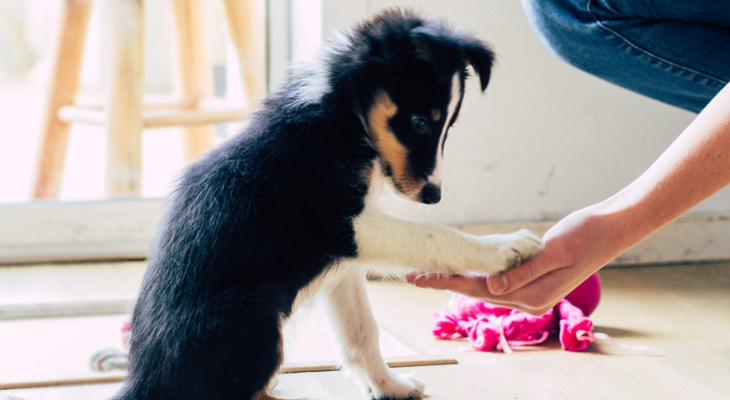
Where to Start When Training Your Puppy
Without training, your cute, cuddly puppy could become difficult to live with in a matter of months. Luckily, early socialization and training will help your pet learn how to behave in any situation.
Socialization Provides the Foundation for Training
The moment your puppy walks through your front door, it's greeted with new sights, sounds, and smells. Not surprisingly, the experience can be a little overwhelming for a young pet. Concentrating on socialization and adjustment during the first few weeks will improve your puppy's confidence and set the stage for training.
Socialization can include:
- Meeting Family Members. Ask everyone who lives in your home to spend a little time gently handing the puppy. If you have children, supervise their interactions with the puppy, as young kids may become too rough when they're excited.
- Exploring Your Home. Whether you live in a small apartment or a large house, your home will seem enormous to your puppy. In the beginning, it may be helpful to use baby gates to confine your pet to one or two rooms of your home. Once your pet becomes comfortable in those spaces, gradually introduce it to the rest of your home.
- Creating a Den. Crates serve as dens and help puppies feel safe and secure. Thinking of buying a bigger crate that will fit your puppy as it grows? Use partitions to create a smaller, puppy-sized space. If the crate is too big, your puppy may be tempted to use one end as a bathroom. Adding a soft blanket or pad makes the crate a comfortable place to sleep.
- Introducing New People and Places. Expose your puppy to as many new people and places as possible during its first few months. Ask your friends to stop by (one at a time) to meet your new addition. Go for walks around your neighborhood, or take your pet to the pet store. Although new experiences are important, wait for vaccinations to take effect before visiting places where your puppy could come in contact with other dogs. The American Kennel Club recommends waiting 7 to 10 days after the final vaccination series to make a trip to a dog park.
- Establishing a Routine. Just like children, puppies need regular routines. Provide meals at the same time every day, and stick to the same bedtime routine. Set the stage for house training by taking your pet outside to relieve itself every hour or two during the day, first thing in the morning, after meals and naps, and before bedtime.
Important Skills to Teach Your Puppy
After your puppy has been with you for a few weeks, begin teaching these skills:
- Commands. Teaching basic commands, like sit, stay and come, not only makes life more pleasant at home but ensures that your dog will be welcome in public places. Use positive reinforcement only when training your pet. Hitting or scolding your dog won't help it learn commands faster and may make your dog become fearful. For example, when teaching the sit command, say the word, "sit,", then gently push your dog's back end down. Immediately, offer a small treat to help your pet make a positive association between the word and the action. PetMD notes that training can begin when your puppy is young as 8 weeks but recommends limiting early training sessions to no longer than five minutes.
- Walking on a Leash. Learning how to walk on a leash without pulling is one of the most important skills your dog can learn. Attach the leash with a harness that fits around your puppy's abdomen and chest, rather than a collar. Start leash training gradually by letting your puppy play in your home wearing the harness and leash. Work on walking on the leash in your home before eventually venturing outside. Offer treats when your puppy walks by your side, even it's only for a few steps.
- House Training. Thanks to the schedule you started when you brought your puppy home, your new pet should already associate outdoors with elimination. Puppies usually can't control their bladders and bowels until about three or four months, which is when housetraining should start. When you take your puppy outside, say "potty," (or any word you want) to indicate that it's time to eliminate. If your puppy urinates or defecates, praise it or offer a treat.
Has your new puppy visited the veterinarian yet? Give our office a call to schedule your pet's first appointment.
Sources:
American Kennel Club: Puppy Socialization: Why, When and How to Do It Right, 7/7/2022
https://www.akc.org/expert-advice/training/puppy-socialization/
PetMD: How to Start Training Your Puppy
https://www.petmd.com/dog/training/when-start-training-puppy
Hill’s: Puppy Obedience Training: Tips for a Successful Approach, 8/3/2018
https://www.hillspet.com/dog-care/training/puppy-obedience-training
American Kennel Club: Puppy Training Timeline: Teaching Good Behavior Before It’s Too Late, 1/1/2022
